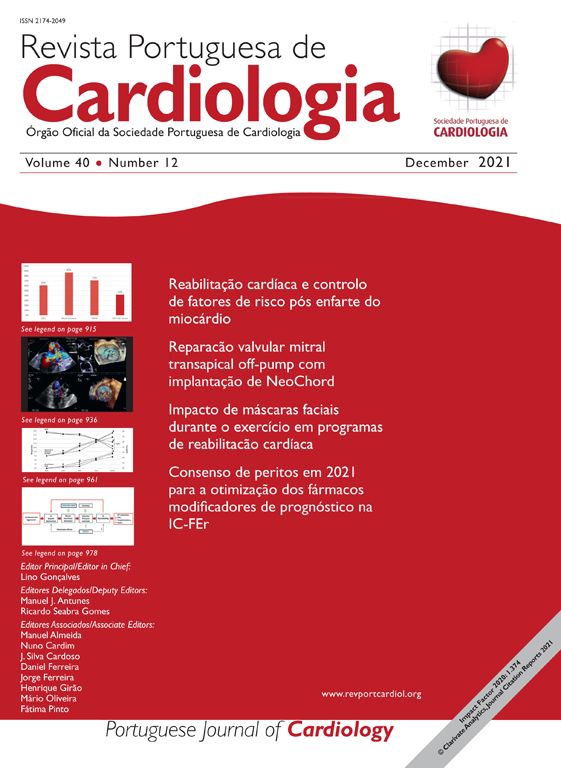Chronic heart failure (CHF) is the final common pathway for various cardiac pathologies and, despite significant progress in its treatment in recent years, this complex clinical syndrome still has a poor prognosis.1,2
Cardiac resynchronization therapy (CRT) is a well-established option in the treatment of CHF that results in significant clinical improvements, ventricular reverse remodeling, and lower mortality in selected patients.2–4 However, based on current selection criteria, a significant proportion of patients with CHF do not respond positively to CRT.5 It is therefore important to identify new predictors that will improve the selection of potential responders to this therapy.
Although the pathophysiology of CHF is still poorly understood, neurohormonal stimulation and immune activation have been shown to be involved in the development and progression of this systemic disease.6,7 There is growing evidence that levels of various pro-inflammatory cytokines are elevated in patients with CHF, and that this inflammatory response has negative prognostic implications. C-reactive protein (CRP) has been widely studied and is present at higher levels in patients with CHF than in healthy controls.8 Furthermore, high CRP levels in patients with CHF are associated with a worse prognosis.8
However, the impact of CRT on the progression of the systemic inflammatory status associated with CHF has been little investigated, and the scarce information available is contradictory. The study by Almeida-Morais et al. published in this issue of the Journal is thus of considerable relevance.9
The authors present a prospective cohort study involving 115 patients with advanced heart failure of different etiologies and with indication for CRT. The primary aim of the study was to assess changes in inflammatory response based on B-type natriuretic peptide (BNP) and CRP levels following CRT. The secondary aim was to determine the association between changes in inflammatory parameters and functional and echocardiographic response to CRT. The authors defined patients with a minimum increase of 10% in peak oxygen consumption as functional responders, and used the conventional definition of echocardiographic responders as those in whom a reduction of at least 15% in left ventricular end-systolic volume was seen six months after device implantation.
This new study reports innovative and interesting results with regard to the behavior of the inflammatory response in patients undergoing CRT. Overall, CRT was associated with a significant reduction in plasma BNP and CRP levels, suggesting that, in addition to slowing progression of CHF, CRT may also help directly or indirectly to reduce systemic inflammation.
Previous studies have assessed the impact of CRT on the systemic inflammatory response associated with CHF, showing a significant reduction in many inflammatory mediators.10–13 In some of these studies, this reduction was only seen in CRT responders.14,15 However, the literature also includes other studies in which the effect of CRT on inflammatory markers was neutral, even in responders.16,17
The authors of the study observed that functional and echocardiographic responses to CRT were not correlated and that, oddly, only functional responders presented a significant post-CRT reduction in inflammatory parameters. According to these innovative results, improvement in inflammatory status may occur in response to functional improvement in CHF, even in the absence of ventricular reverse remodeling.
Despite the limitations arising from the heterogeneity of the study population in terms of CHF etiology, which may lead to differences in immune activation, this study had the advantage of including a population under optimal pharmacological CHF therapy and with very similar clinical presentations in both responders and non-responders, by both echocardiographic and functional criteria.
We are far from fully understanding the mechanisms behind the effect of CRT on the systemic inflammatory response in CHF, and many questions remain that merit further investigation. If CRT reduces the inflammatory status of patients with CHF, what are the mechanisms underlying this improvement, and what prognostic impact could that reduction in systemic inflammation have? Moreover, can systemic inflammation determine the functional response to CRT? Can immune mechanisms also influence the ability of CRT to induce ventricular reverse remodeling?
Uncertainties remain concerning the impact of CRT on systemic inflammation. However, there is increasing evidence to support the promising hypothesis of a new form of response to CRT – the reduction of inflammatory status associated with CHF.
Conflicts of interestThe author has no conflicts of interest to declare.
Please cite this article as: António N. Redução da inflamação sistémica após terapêutica de ressincronização cardíaca: uma nova forma de resposta? Rev Port Cardiol. 2018;37:115–116.



